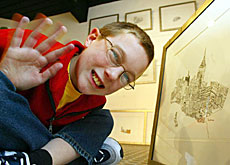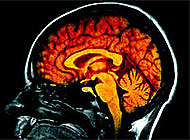Report calls for end to neglect of autism

Switzerland lags far behind many European countries in the treatment it offers to sufferers of autism, according to a report.
The survey found that the authorities were also failing to provide adequate support and advice for parents of autistic children.
Autism is a developmental disability that affects the way a person communicates and relates to people around them.
Children and adults who suffer from autism usually have difficulties with everyday social interaction and often have associated learning disabilities.
“What we see in cases of autism is a very profound deficit in terms of forming interpersonal relationships,” said Hans-Christoph Steinhausen, director of the department for child psychiatry at Zurich University and author of the 2004 report into autism in Switzerland.
“We have learnt quite recently that there is a wide spectrum of severity of autism and this has led to the understanding that prevalence of the disorder is much higher than in the past,” he told swissinfo.
Investigating prevalence
Though there are no precise figures on the number of people in Switzerland living with autism, it is estimated that the condition affects around 0.5 to 0.8 per cent of the Swiss population.
Steinhausen said the Swiss survey was conducted to collect data on the prevalence of autism and to investigate the standard of care and treatment available to autistic children and adults.
“Surprisingly, we found that Switzerland does not meet the standards that are seen in other parts of Europe such as Scandinavia, the Netherlands, Germany and Britain,” he said.
“We found that the public is not well informed [about autism] and parents… are not getting sufficient assistance. They are dissatisfied with the support they get from professionals and from the government.”
Brigitt Germann of the parent group Autism Switzerland welcomed the report’s findings.
“What is particularly important about this report is that it does not gloss over the situation in Switzerland,” she said.
“It is very clear that there are a large number of autistic people who are not getting the treatment they need… and it is difficult to understand why we in this country have such a backward stance when it comes to autism.”
The survey also found that professional care provided to individuals with autism has “not been open enough” to research conducted in other parts of the world.
“Child psychiatry has failed to keep track of developments in other countries and there has not been much interest in autism,” commented Steinhausen.
No unified voice
One explanation for the lack of public awareness about autism, according to Steinhausen, has to do with the fact that the Switzerland is divided into different language regions.
“In the United States, if you come up with any idea to improve the life of a handicapped person, you will have 100,000 people behind you… but in a small country like Switzerland where different languages are spoken it is much more difficult for lobby groups to make themselves heard.”
An additional problem highlighted by the report is that many children who display symptoms of autism are slipping through the net.
“A large number of autistic children are simply misdiagnosed as mentally retarded,” said Steinhausen, with the result that many do not receive the treatment they need.
Autism Switzerland hopes that the report will be a first step towards making people more aware of a disability for which there is no known cure.
“This report could be the start of a new campaign to improve the situation for autistic people in Switzerland,” said Steinhausen.
“We have to install major centres that can provide early diagnosis and support to those living with autism.”
swissinfo, Ramsey Zarifeh
Autism is a developmental disability that typically appears during the first three years of life.
People with autism have problems with social interaction as well as verbal and non-verbal communication.
There is no known cure for autism, which is more prevalent in boys than girls.

In compliance with the JTI standards
More: SWI swissinfo.ch certified by the Journalism Trust Initiative

You can find an overview of ongoing debates with our journalists here. Please join us!
If you want to start a conversation about a topic raised in this article or want to report factual errors, email us at english@swissinfo.ch.